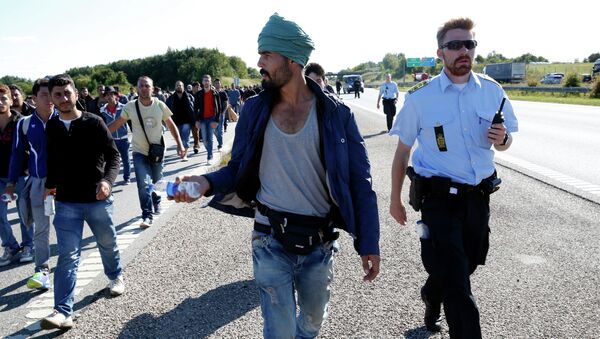An important Danish-Iranian agreement regarding the return of rejected asylum-seekers has stalled after Danish Immigration Minister, Inger Støjberg, posted a Muhammad cartoon on social media last year, Danish Radio reported, citing an internal document from the ministry.
One year later, Støjberg is yet to visit Tehran, and Denmark still hasn't landed an agreement on the failed asylum-seekers from Iran.
"As part of the asylum-seeker dialogue with Iran, a visit by the immigration minister to Tehran was scheduled for November 2017. The visit was postponed as the Iranians expressed displeasure with the minister's iPad desktop", Støjberg was quoted by Danish Radio as saying during a hearing.
The government, the right-wing Danish People's Party and the opposition Social Democratic party all agree that the agreement is important. At the Departure Centre in Kærshovedgård, rejected asylum seekers from Iran constitute a clear majority. Last year, 110 of its almost 200 residents were from Iran.
READ MORE: Denmark Mulls Penalizing Iran With Sanctions Down to 'Diplomatic Atomic Bomb'
Social Democrats foreign spokesman Mattias Tesfaye refused to comment on Inger Støjberg's choice of background on her iPad, but called it a "shame" that the agreement still isn't in place. He also called on the government to push Iran to reach the deal he called a "boon" for Denmark.
Even the Danish People's Party, a long-time staunch defender of the 2005 drawings that invoked what in Denmark is referred to as "Muhammad crisis", admitted that Støjberg should have considered the consequences of her actions.
"Regardless of whether you are an MP, minister or whatever, you should always think over what you do and say, particularly when you are negotiating the return of Iranian asylum seekers", Danish People's Party immigration spokesman told Danish Radio. "That said, I think it's difficult to criticise the minister for having a cartoon on her iPad. I believe it's a bit ridiculous on Iran's part to make a fuss over this. They are Islamists and most of the time are insulted by one thing or another", Henriksen added, nevertheless calling the deal "very important".
According to Danish Radio's political commentator, Jens Ringberg, Støjberg took a stance for Denmark's token case, the question of the freedom of expression. He also recalled that Danish flags were burned in Tehran during the cartoon controversy, and the drawings have been hardly forgotten. He also suggested that Foreign Minister Anders Samuelsen may handle the case instead of Støjberg.
Støjberg herself voiced commitment to "show support and sympathy for Muhammad cartoonists in Denmark". Her government is admittedly still working to reach a return agreement with Iran.
READ MORE: Denmark Hit by Hack Attack in Rekindled Muhammad Cartoons Controversy
Last year, the hard-line immigration minister from the liberal conservative Venstre party incited controversy by posting a photo of one of the contentious Muhammad cartoons from 2005 on her iPad desktop, namely Kurt Westergaard's picture of the prophet clad in a bomb-like turban.
In 2005, Jyllands-Posten, one of Denmark's leading dailies, posted twelve caricatures of Muhammad, which triggered angry reactions across the Muslims world, with riots, attacks on Danish embassies and a strong international backlash against Copenhagen. Since then, some of the cartoonists have been receiving death threats and have been forced to live under constant surveillance.
After more than a decade, the cartoons still have an effect on Denmark's security, according to the Danish Security and Intelligence Service (PET), which signals the highest level of terrorist threat from people sympathising with militant Islamism and motivated, among other things, by the cartoon controversy.




